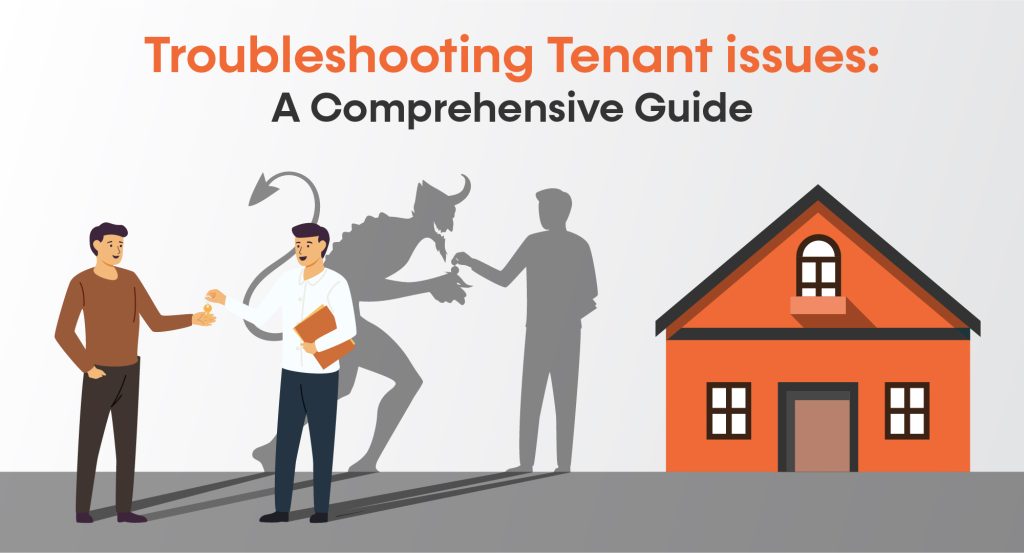It can seem like a heavy order at times to make sure that every tenancy you establish operates properly, regardless of whether you are managing a single rental home or a large property portfolio. However, there are ways to mitigate the drawbacks of renting out a buy-to-let property, starting with understanding the typical problems that landlords encounter and how to resolve them. Here, we provide some guidance to owners of rental properties who want to address the common issues that they encounter.
You have legal recourse to evict your tenant if they violate the regulations in spite of your best efforts to accommodate them. Renters who participated in the poll acknowledged having missed rent payments by a remarkable 25.1% of them. Additionally, 28% of renters had a criminal history, according to another survey. Luckily, in 1948 the Indian government created the Rent Control Act, which allowed landlords to rectify dire situations. This legislation was designed to ensure that everyone is treated fairly in the eyes of the law and that neither landlords or tenants abuse one another’s rights.
We’ve put up a list of frequent issues landlords encounter along with remedies to assist you avoid difficult situations so you can deal with undesirable tenants with ease. Follow these tips to become the best landlord you can be to your tenants.
Tenants who fail to pay their rent on time
Regarding rent payments, this is the most frequent problem that landlords or property owners encounter. It’s essential to inform your tenant that you won’t accept late rent payments inside the lease payment in order to prevent conflicts with them later on. Regretfully, because some tenants have a practice of paying late, some tenants might not resolve issues. So you must be assertive in these situations and take action.
Landlords frequently charge late rent payments with a penalty. Incorporate it into the leasing agreement if you think this is a good bargain. Conversely, in case you observe that a renter is routinely making late rent payments, have a conversation with them.
Landlords frequently charge late rent payments with a penalty. Incorporate it into the leasing agreement if you think this is a good bargain. Conversely, if you observe that a renter is routinely missing rent payments, have a conversation with them to see if there is a valid cause for their behaviour. For instance, you can set up payment choices to make the payment process simpler if you see that a renter struggles with cash flow. Before it’s too late, you ought to give them a “pay or quit” notice if nothing changes.
How to get your overdue rent paid
As a landlord, collecting past-due rent from tenants not only hurts your bottom line but also requires time, effort, and worry. Ensure that you have procedures in place to stop problems caused by a renter who doesn’t pay their rent on time. Reletting problems such as these to fester is a typical error made while leasing out apartments. It could be important to take precautions like sending out warnings of late rent or making a courteous phone call—preferably both.
In the worst event, despite receiving late payment reminders, your tenant decides not to pay rent. In order to inform your renter that you want to evict them, you may need to give them a pay or leave notice at this point. You can take legal action if everything else fails and the tenant continues to not pay the rent. Just be careful to comprehend the eviction procedures as stipulated by the state laws to determine the minimum amount of rent arrears the renter must pay before facing eviction and the maximum amount of time they have to pay it.
Managing Legal Matters Independently
It can be overwhelming to learn all of the landlord-related legislation. To keep themselves out of legal problems, property owners need to be aware of these laws. The federal and state governments have enacted numerous legislation to safeguard both tenants’ and landlords’ rights. Getting yourself into a legal bind with your tenant can have detrimental effects on both your personal and financial well-being, particularly in cases when the tenant has the legal right to be there.
Make sure you obtain a trustworthy tenant by conducting background checks, and acquire a formal rent agreement signed by the tenant and yourself to prevent getting into any legal hot water. The terms pertaining to tenancy termination, the date of rent payment, and other significant clauses must all be included in the agreement.
By doing background checks on potential tenants, gathering supporting documentation, drafting and distributing an online lease agreement, handling prompt rent payments, and overseeing all other duties there are many websites that can assist you with all of these responsibilities.
Tenant Breach of Lease
There are situations when a renter decides not to abide by the conditions of the lease. For example, if there is a no-pets policy and he brings a new dog into the house, he has broken the rules. He has broken the terms of the lease if he has seven or eight guests living there each night while the agreement only permits four unrelated people to live on the property. A formal warning of the infraction, a reference to the offending section of the lease, and a deadline for the tenant to fix the issue are typically provided by the landlord. In the event that the tenant continues to violate the terms of the lease, it might be necessary to start the eviction procedure.
Tenants not allowing enter the property
Another common landlord difficulty is obtaining access to the rented property when necessary. Landlords are obliged to do routine checks and upkeep on their rental properties to ensure that they are in excellent shape; nonetheless, regardless of the landlord’s intentions, it is critical that they respect the occupant’s right to peacefully take advantage of the property. An infringement on the tenant’s “quiet enjoyment” would occur from any action determined by the landlord to “substantially interfere with the tenant’s freedom of action by exercising” their rights. Tenants are granted the ability to utilise the rental property without interference, allowing them to choose their own hours for guests to enter.
For this reason, authorization from the tenants must be obtained at least 24 hours in advance of any entry by the landlord, leasing agent, or any pertinent parties wishing to access the rental property. The property’s occupants would have every right to reject this request, but this is not often the case. It is significantly more frequent for the renters to just schedule the visit at a more convenient time for both parties. However, if the landlord is confronted with a tenant who persistently refuses to allow them access to the rental property, and the problem remains, the landlord may be relieved of their obligation to make repairs since the tenant is preventing them from doing so.
Security Deposit
Tenancy deposits serve as an extra security precaution against their rental income, which is why so many landlords decide to collect them from their renters. The costs of replacing and repairing the damaged things will be subtracted from the tenancy deposit if, at the conclusion of the tenancy, it is discovered that the tenant has seriously damaged the rental property and its furniture. The landlord may also utilise this sum, as was previously indicated, to collect any unpaid rent that the tenants may owe at the conclusion of the agreed-upon term.
Consequently, the amount that is returned to the renter cannot be reduced by the landlord for each scratch and imperfection that is discovered during the last examination of the rented property. This is known as fair wear and tear and includes the normal deterioration of a building and its contents over time; the landlord is not able to recover these expenditures because the inhabitants’ carelessness or malice was not the reason for this.
How to Prevent Recurring Evictions
The process of getting evicted can be expensive and frustrating. Consider using these three proactive strategies to prevent frequent evictions rather than enduring the damage they can do to your finances and mental health:
- Boost the Tenant Screening Process.
- Put Payment Plans into Action.
- Improve the Tenant-Landlord Relationship.
Boost the Tenant Screening Process
Tenant selection is a typical issue faced by landlords; one of the best methods to prevent these issues is to thoroughly screen all potential renters before renting out your home. In this manner, you may rest easy knowing that there is little chance of an eviction for any of your tenants. The following steps are necessary for a successful screening process:
- Verify the credit of the renter.
- Run a criminal background investigation.
- Consult the former landlords of a renter for references.
Put Payment Plans Into Practice
Even the best tenants could experience unanticipated financial difficulties. In order to help them pay their rent at that point, you might want to think about setting up a payment schedule for them. After all, if they follow your payment plan restrictions, you may discover that keeping them around is preferable to going through the costly eviction procedure and having a vacant property.
Just be careful that when you set up your payment plan, you don’t reduce the amount of rent due. Otherwise, news could spread that you are willing to lower the required monthly rent, prompting your other tenants to want lower rates.
Enhance Tenant-Landlord Relationships
Tenants might easily ignore you and cease paying rent without feeling guilty if you don’t connect with them on a regular basis. As a result, be careful to communicate with tenants on a frequent basis (without being bothersome, of course) and value their opinions. This way, rather than constantly reacting after something has gone wrong, you may be more proactive in preventing issues.
Also Read - Tenant Issues Related To Owner: A Comprehensive Overview
In summary
Dealing with problematic tenants presents a lot of challenges because one slip-up can damage your property’s reputation and complicate your future tenant acquisition process. Start by contacting the tenant’s prior landlords and requesting any pertinent information; this will demonstrate that you are taking the screening procedure seriously.
You may simply handle any issues brought on by those troublesome tenants and keep your good reputation by paying attention to the advice provided above. Put your property up for rent on Lets Rentz and attract quality tenants with solid rental agreements.



